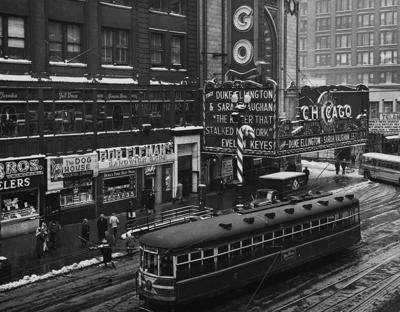Photo credit: Chicago Theatre street scene 1951 Chicago History Museum, ICHi-019350; Harold Beach, photographer
By Elisa Shoenberger
Chicago’s Christmas traditions are a mixture of ethnic and racial celebrations, combined with the strategy of the city’s retailers to form the public celebrations we know today.
“One of the things people don’t know is that 19th century immigrants (brought) many of the Christ- mas traditions that we know in the U.S.,” said Julius Jones, assistant curator at the Chicago History Museum. While the Christkindlmarket is a relatively new tradition in Chicago, beginning in 1996, German Christ- mas traditions go back to before the Great Chicago Fire in 1871.
But Chicago’s Christmas traditions aren’t just based on Germanic traditions. Ethnic and racial groups throughout the city celebrate the holiday in their own robust and unique ways, Jones said. For example, a midnight Christmas processional takes place in the Ukrainian Village in January, in accordance with the Ukrainian Orthodox calendar.
Many Chicagoans, regardless of background, have traditions centering on the great Christmas tree in the Walnut Room of the former Marshall Field’s department store. In 1907, waiters put up the tree themselves in the room, according to Jones. By the mid-20th century, it was the biggest Christmas tree in the U.S. and people would flock from all over to see it. Macy’s, the current occupant of the former Marshall Field’s building, keeps the tradition going.
“Retailers absolutely made Christmas into what it is now—a shopping experience,” Bill Savage, Northwestern professor and Chicago historian, said. Retailers such as Marshall Field’s and Montgomery Ward were instrumental in creating the visual culture of Christmas, Jones said.
The Ward catalog “was the place where you ordered Christmas presents from afar. Marshall Field’s was where families went to look at the window decorations, and to not just buy Christmas presents, but as a family outing,” Savage said, noting that even the famous character Rudolph the Red-Nosed Reindeer was first commissioned by retailer Montgomery Ward in 1939.
While certain traditions have persisted, some traditions have fallen by the wayside. Notably, the Christmas Tree Ship that allegedly brought thousands of trees to Chicago in the late 19th century. A ship called Rouse Simmons brought trees from Michigan, until it sank in a terrible storm in 1912.
A year later, Chicago put up its first official tree in north Grant Park, commissioned by Mayor Carter Harrison Jr. The tradition continues but now in Millennium Park. The tree had been moved to Daley Plaza in 1966 and in 1982 it stood at State Street and Wacker Drive.








(0) comments
Welcome to the discussion.
Log In
Keep it Clean. Please avoid obscene, vulgar, lewd, racist or sexually-oriented language.
PLEASE TURN OFF YOUR CAPS LOCK.
Don't Threaten. Threats of harming another person will not be tolerated.
Be Truthful. Don't knowingly lie about anyone or anything.
Be Nice. No racism, sexism or any sort of -ism that is degrading to another person.
Be Proactive. Use the 'Report' link on each comment to let us know of abusive posts.
Share with Us. We'd love to hear eyewitness accounts, the history behind an article.